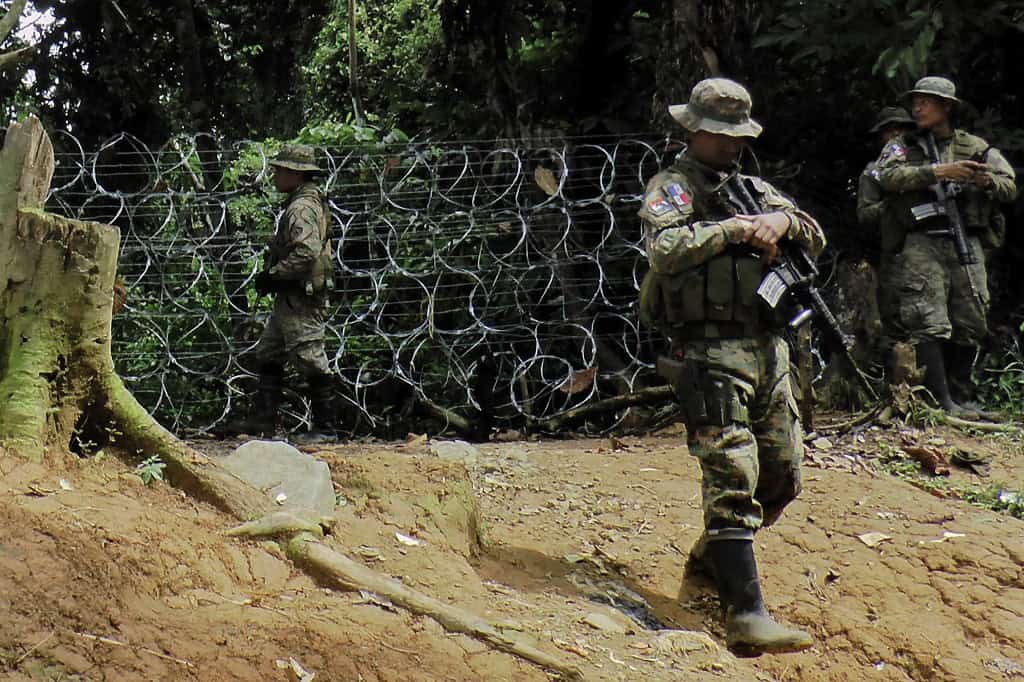Ten migrants died due to the rise of a river in an isolated area of Panama near the Caribbean coast and the border with Colombia, the border police (Senafront) reported on Wednesday. “In the river tributaries near the community of Carreto [in the indigenous region of Guna Yala], 10 bodies of migrants who drowned as a result of a flash flood (river rise) were observed,” Senafront said in a statement.
“Transnational organized crime, through local collaborators in these coastal Caribbean communities, insists on using unauthorized routes, putting these people’s lives at serious risk,” the statement added. The note does not specify if the deceased had crossed the Darién jungle—turned into a corridor for migrants trying to reach the United States—or if they arrived by boat. It also does not specify the nationalities of the victims.
In 2023, more than half a million people crossed this jungle, according to official figures, despite dangers such as fast-flowing rivers, wild animals, and criminal groups that rob, rape, and kill. Most of the migrants crossing the Darién are Venezuelan, but Ecuadorians, Colombians, Haitians, and Chinese are also prominent. Panamanian authorities are unaware of the exact number of people who die on this journey due to the terrain’s inaccessibility and because sometimes the bodies are devoured by animals.
Trail closures
In recent weeks, the Panamanian government has closed several trails used by people crossing the jungle and opened a “humanitarian corridor” to control migrants and prevent them from being attacked by criminal gangs.
With this “humanitarian corridor,” Panamanian authorities also aim to ensure migrants reach a shelter safely where they are attended to by international organizations such as the Red Cross, UNICEF, or UNHCR. The closure of the jungle routes was criticized by Colombia’s president, Gustavo Petro, who claimed that “barbed wire in the jungle” would only bring “drownings in the sea.”
Imminent deportations
To try to reduce this migratory flow, Panama and the United States signed an agreement on July 1 whereby Washington commits to financing the deportation and expulsion of people crossing the Darién from the Central American country with six million dollars. The start of “deportations and expulsions” on charter and commercial flights is “imminent,” warned the U.S. regional Homeland Security attaché, Marlen Piñeiro, on Tuesday.
“We have already visited all the airports […], we have visited the Darién, we have visited places where we are going to have the people, we have also talked with the airlines, the contractors, and we are already in the final details,” Piñeiro added. However, last Thursday, the president of Panama, José Raúl Mulino, ruled out forcibly repatriating migrants.
“People don’t want to stay in Panama; they want to go to the United States, and if this issue becomes a situation for us, it could escalate to a greater or lesser degree, so that’s where they will go,” Mulino stated. During his electoral campaign, he promised to “close” the Darién, a natural border of 266 km in length and 575,000 hectares in area with Colombia.
Cleanup
Panama is preparing, together with the United States, a cleanup program for the Darién, a jungle of 575,000 hectares in area, which has been affected by the passage of migrants, announced Environment Minister Juan Carlos Navarro on Wednesday. According to Mulino, each migrant drops an average of 2.2 kilos of trash as they pass through this dense vegetation jungle with a wide variety of flora and fauna species.
Navarro lamented the death of the migrants: “Ten more lives lost due to irregular and inhuman trafficking through the Darién. We must bring order to these areas, end this trafficking as soon as possible, and clean up nature,” said Navarro. According to Navarro, the project includes cleaning, environmental restoration of the damaged area, and “economic support” for local communities.






